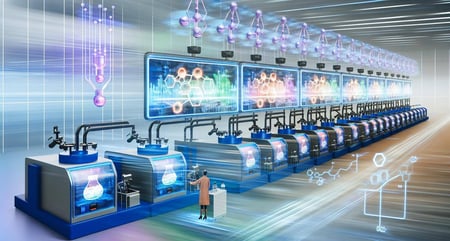AI-Based Demand Sensing for Responsive Production Scheduling
The ability to anticipate market demand and adapt production schedules accordingly is essential in chemical manufacturing. Traditional forecasting methods often fall short in accurately predicting demand fluctuations, leading to inefficiencies, excess inventory, and missed opportunities.
However, with advancements in artificial intelligence (AI) and supply chain management (SCM) technology, a new era of demand sensing has emerged, promising responsive production scheduling like never before.
Supply chain managers in chemical manufacturing facilities are constantly seeking ways to optimize operations, reduce costs, and enhance customer satisfaction. This is where AI-based demand sensing comes into play, offering a data-driven approach to forecasting that leverages real-time insights and predictive analytics.
By integrating AI-powered solutions with enterprise resource planning (ERP), SCM, and manufacturing execution systems (MES), such as PlanetTogether and leading platforms like SAP, Oracle, Microsoft, Kinaxis, and Aveva, chemical manufacturers can achieve a level of agility and responsiveness that was previously unattainable.

What is AI-Based Demand Sensing?
At its core, AI-based demand sensing involves the use of machine learning algorithms to analyze vast amounts of data from various sources, including historical sales data, market trends, weather patterns, and social media signals. By identifying patterns and correlations within this data, AI algorithms can generate highly accurate demand forecasts in near real-time, enabling organizations to make proactive decisions and adjust production schedules accordingly.
Unlike traditional forecasting methods that rely on historical data and manual input, AI-based demand sensing takes a holistic approach, considering both internal and external factors that may influence demand. This holistic view allows supply chain managers to anticipate changes in customer behavior, market dynamics, and supply chain disruptions, enabling them to optimize inventory levels, minimize stockouts, and maximize operational efficiency.


The Integration Advantage: PlanetTogether and ERP/SCM/MES Systems
One of the key drivers of successful AI-based demand sensing is integration with existing ERP, SCM, and MES systems. These systems serve as the backbone of manufacturing operations, providing crucial data on inventory levels, production capacity, and resource availability. By integrating AI-powered demand sensing solutions such as PlanetTogether with leading ERP, SCM, and MES platforms, chemical manufacturers can unlock several benefits:
Real-time Data Synchronization: Integration ensures seamless data exchange between demand sensing algorithms and ERP/SCM/MES systems, allowing supply chain managers to access up-to-date information on inventory levels, production schedules, and customer orders in real-time.
Enhanced Forecast Accuracy: By combining historical data from ERP/SCM/MES systems with external data sources, AI algorithms can generate more accurate demand forecasts, taking into account factors such as seasonality, market trends, and customer preferences.
Optimized Production Scheduling: With timely insights into demand fluctuations, supply chain managers can adjust production schedules on the fly, optimizing resource allocation, minimizing lead times, and reducing production bottlenecks.
Improved Inventory Management: By aligning production schedules with demand forecasts, chemical manufacturers can better manage inventory levels, reducing excess stock and carrying costs while ensuring product availability to meet customer demands.

Best Practices for Implementing AI-Based Demand Sensing
While the benefits of AI-based demand sensing are clear, successful implementation requires careful planning and execution. Here are some best practices for supply chain managers looking to leverage AI-powered solutions for responsive production scheduling:
Define Clear Objectives: Clearly define your goals and objectives for implementing AI-based demand sensing, whether it's reducing inventory costs, improving customer service levels, or optimizing production efficiency.
Select the Right Technology Partners: Choose reputable technology partners with expertise in AI, SCM, and manufacturing software integration, such as PlanetTogether and leading ERP/SCM/MES providers.
Ensure Data Quality and Accessibility: Ensure that your ERP/SCM/MES systems are properly configured to collect and store accurate data, and establish data integration protocols to enable seamless communication with AI-based demand sensing solutions.
Invest in Employee Training: Provide training and support to employees involved in demand planning, production scheduling, and inventory management to ensure they understand how to leverage AI-powered insights effectively.
Monitor and Adapt: Continuously monitor key performance metrics and adjust your strategies based on real-world feedback and changing market conditions to drive continuous improvement.
AI-based demand sensing represents a transformative opportunity for chemical manufacturers to achieve responsive production scheduling and optimize supply chain operations. By integrating AI-powered solutions with ERP, SCM, and MES systems such as PlanetTogether and leading platforms like SAP, Oracle, Microsoft, Kinaxis, and Aveva, supply chain managers can unlock new levels of agility, efficiency, and customer satisfaction.
As the pace of technological innovation accelerates and customer expectations continue to evolve, embracing AI-based demand sensing is no longer a luxury but a necessity for staying competitive in the dynamic landscape of chemical manufacturing.
By harnessing the power of AI and data-driven insights, chemical manufacturers can pave the way for a more resilient, agile, and sustainable future. Are you ready to take your manufacturing operations to the next level? Contact us today to learn more about how PlanetTogether can help you achieve your goals and drive success in your industry.


